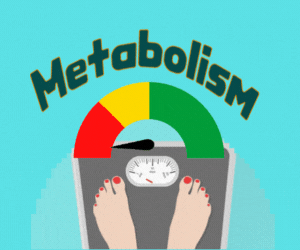
Metabolism plays a crucial role in how our bodies process food, convert it into energy, and determine our ability to lose or maintain weight. However, there are countless myths surrounding metabolism and weight loss that often leave people confused and frustrated. In this blog, we’ll debunk some of the most common misconceptions and provide actionable tips to help you better understand your metabolism and make informed choices for sustainable weight loss.
Myth
Metabolism Slows Down with Age and Becomes a Barrier to Weight Loss.
Fact: Aging impacts metabolism, but it’s not a deal-breaker.
Many believe that as we age, metabolism inevitably slows down, making weight loss much more difficult. While it’s true that metabolic rate decreases with age, particularly due to a loss of lean muscle mass, it’s not a fixed outcome.
- Muscle mass plays a significant role in maintaining metabolic rate. Research shows that aging reduces muscle mass (also known as sarcopenia), which leads to a slower metabolic rate.Metabolic changes do occur with aging, they are not solely responsible for weight gain. The decline in muscle mass, particularly fast-twitch fibers, is a significant factor contributing to a lower metabolic rate in older adults. The study highlights that aging is associated with a down regulation of specific proteins crucial for muscle function, which can lead to decreased energy expenditure (Gueugneau et al., 2021). However, this decline can be mitigated through strength training and maintaining physical activity.
- Lifestyle factors such as resistance training and consuming adequate protein can help preserve muscle mass and boost metabolic rate, making weight loss achievable at any age (Murgia et al., 2017).
 Bonne Sante Tip
Bonne Sante Tip
Incorporate resistance exercises to build and maintain muscle, stay active, and prioritize protein intake to support metabolic health.
Myth
Eating Small, Frequent Meals Boosts Metabolism.
Bonne Sante Tip
Focus on nutrient-dense meals that meet your daily caloric needs rather than obsessing over meal frequency.
Fact: Meal frequency has minimal impact on metabolism.
It’s commonly believed that eating small, frequent meals speeds up metabolism and promotes weight loss. However, research shows this is not supported by evidence.
- Total calorie intake and the composition of meals (i.e., macronutrients like protein, fats, and carbs) play a more critical role in metabolic health than meal frequency.
- A systematic review by Jafari-Vayghan et al. (2020) found no significant effect of meal timing on metabolic rate or weight loss outcomes.
Myth
Severe Caloric Restriction Is the Most Effective Way to Lose Weight.
Fact: Extreme caloric deficits can slow down metabolism.
Many believe that cutting calories drastically is the quickest way to shed pounds. However, extreme calorie restriction triggers metabolic adaptations that can slow weight loss.
- Byrne et al. (2012) highlight that severe calorie restriction often leads to physiological compensations, including reduced energy expenditure. This makes long-term weight loss less effective as the body adapts to conserve energy.
- A balanced approach to dieting, focusing on moderate calorie deficits, helps preserve metabolic function.
 Bonne Sante Tip
Bonne Sante Tip
Adopt a sustainable, moderate calorie deficit combined with balanced macro nutrients to support long-term weight loss.
Myth
Metabolic Adaptation Is a Major Barrier to Weight Loss Maintenance.
 Bonne Sante Tip
Bonne Sante Tip
Focus on maintaining a consistent, balanced approach to eating and exercise post-weight loss to prevent metabolic adaptations from derailing your progress.
Fact: Metabolic adaptation occurs, but it’s not a primary barrier.
It’s often believed that metabolic adaptation (slower calorie burn post-weight loss) is the primary reason for weight regain. However, studies by Martins et al. (2020) suggest otherwise.
- Metabolic adaptation is more related to the amount of weight lost, not a direct cause of weight regain. For instance, participants from “The Biggest Loser” competition experienced metabolic adaptations but still regained weight due to poor lifestyle choices rather than metabolic slowing.
- Weight stabilization allows the body’s metabolic rate to normalize over time, highlighting the importance of maintaining a stable weight.
Myth
All Metabolic Boosting Supplements Are Effective.
Fact: Many supplements don’t deliver the promised metabolic benefits.
The market is flooded with supplements that promise to boost metabolism and aid weight loss. However, the reality is more nuanced.
- Some supplements like caffeine and green tea extracts have mild metabolic-enhancing properties, but the overall impact is limited and varies from person to person.
- McCarthy et al. (2011) found that not all supplements are effective, and their effectiveness depends on individual metabolic responses.
 Bonne Sante Tip
Bonne Sante Tip
Consult with a healthcare professional before using supplements and prioritize whole foods, exercise, and balanced nutrition for sustainable results.
Reference
Byrne, N. M., Wood, R. E., Schutz, Y., & Hills, A. P. (2012). Does metabolic compensation explain the majority of less-than-expected weight loss in obese adults during a short-term severe diet and exercise intervention? International Journal of Obesity, 36(11), 1472–1478. https://doi.org/10.1038/ijo.2012.109
Martins, C., Gower, B. A., Hill, J. O., & Hunter, G. R. (2020). Metabolic adaptation is not a major barrier to weight-loss maintenance. The American Journal of Clinical Nutrition, 112(4), 791–796. https://doi.org/10.1093/ajcn/nqaa086
Fothergill, E., Guo, J., Howard, L., Kerns, J. C., Knuth, N. D., Brychta, R., Chen, K. Y., Skarulis, M. C., Walter, M., Walter, P. J., & Hall, K. D. (2016). Persistent metabolic adaptation 6 years after “The Biggest Loser” competition. Obesity, 24(10), 2039–2049. https://doi.org/10.1002/oby.21538
Murgia, M., Toniolo, L., Nagaraj, N., Schiaffino, S., Reggiani, C., & Ma, M. (2017). Single muscle fiber proteomics reveals fiber-type-specific features of human muscle aging. Cell Reports, 19(11), 2396–2409. https://doi.org/10.1016/j.celrep.2017.05.035
Gueugneau, M., Coudy-Gandilhon, C., Chambon, C., Verney, J., Taillandier, D., Combaret, L., Polge, C., Walrand, S., Roche, F., Barthélémy, J.-C., Féasson, L., & Béchet, D. (2021). Muscle proteomic and transcriptomic profiling of healthy aging and metabolic syndrome in men. International Journal of Molecular Sciences, 22(8), 4205. https://doi.org/10.3390/ijms22084205
Jafari-Vayghan, H., Varshosaz, P., Hajizadeh-Sharafabad, F., Razmi, H. R., Amirpour, M., Mohammad Tavakoli-Rouzbehani, O., Alizadeh, M., & Maleki, V. (2020). A comprehensive insight into the effect of glutamine supplementation on metabolic variables in diabetes mellitus: a systematic review. Nutrition & Metabolism, 17(1), 80. https://doi.org/10.1186/s12986-020-00503-6
Ferraz-Bannitz, R., Beraldo, R. A., Peluso, A. A., Dall, M., Babaei, P., Foglietti, R. C., Martins, L. M., Gomes, P. M., Marchini, J. S., Suen, V. M. M., Freitas, L. C. C., Navegantes, L. C., Pretti, M. A. M., Boroni, M., Treebak, J. T., Mori, M. A., Foss, M. C., & Foss-Freitas, M. C. (2022). Dietary protein restriction improves metabolic dysfunction in patients with metabolic syndrome in a randomized, controlled trial. Nutrients, 14(13), 2670. https://doi.org/10.3390/nu14132670
McCarthy, C. G., Farney, T. M., …, & Bloomer, R. J. (2011). A finished dietary supplement stimulates lipolysis and metabolic rate in young men and women. Nutrients & Metabolic Insights, 4, 37–45. https://doi.org/10.4137/NMI.S8567
Vaughan, R. A., Garcia-Smith, R., Barberena, M. A., Bisoffi, M., Trujillo, K., & Conn, C. A. (2012). Treatment of human muscle cells with popular dietary supplements increases mitochondrial function and metabolic rate. Nutrition & Metabolism, 9(1), 101. https://doi.org/10.1186/1743-7075-9-101


